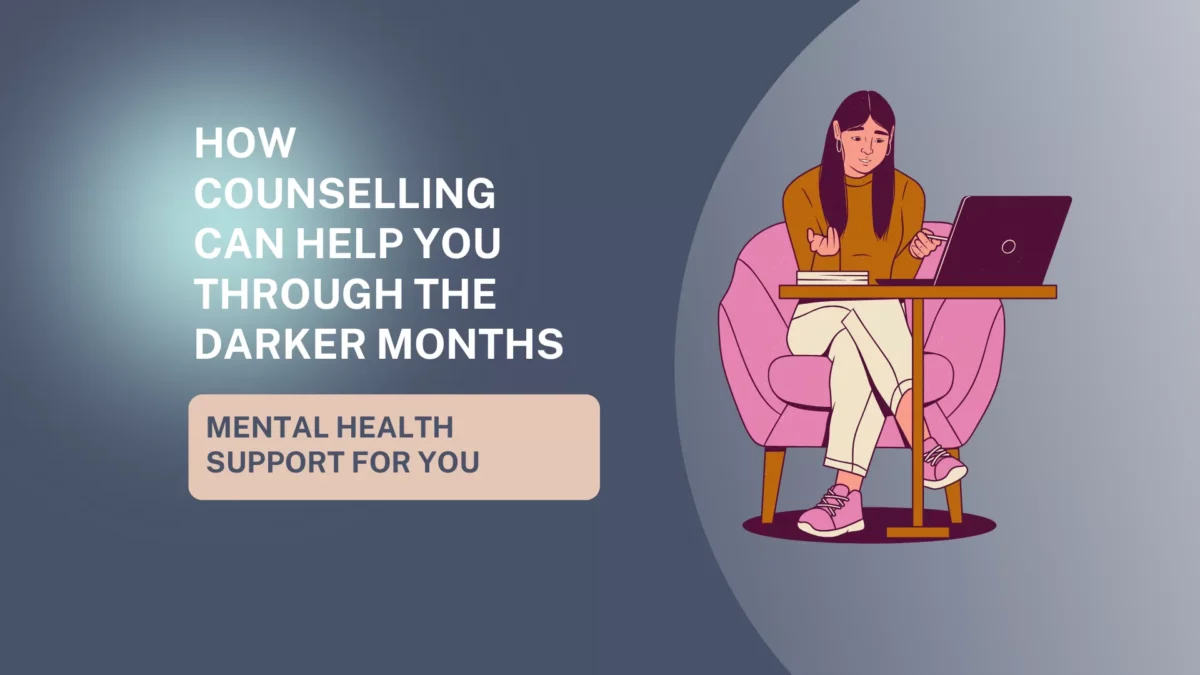1. A space to slow down and reflect
Counselling gives you a weekly moment to pause—a rare chance to listen to yourself rather than rush from one demand to another. At a time when life feels faster but energy feels lower, this can be powerful.
Many clients describe counselling as the only place where they feel able to breathe and genuinely be themselves without pressure to “keep it together.”
2. Emotional regulation and grounding strategies
As anxiety, irritability, and stress increase, counselling can help you build a personalised toolbox of coping strategies. These might include:
- Grounding practices for moments of overwhelm
- Nervous system regulation techniques
- Cognitive reframing for intrusive or anxious thoughts
- Emotion-labelling to reduce the intensity of spiralling feelings
- Seasonal routines to support steadier energy levels
These strategies are especially important in winter, when emotional bandwidth naturally shrinks.
3. Support for Seasonal Affective Disorder (SAD) and winter depression
For people experiencing SAD or seasonal depression, counselling provides both emotional support and practical strategies to counteract symptoms.
Your counsellor might help you:
- understand your seasonal pattern
- strengthen your daily structure
- explore lifestyle changes
- challenge negative thought cycles
- process anything that winter brings up emotionally
Counselling can also run alongside medical support if needed.
4. Managing loneliness and rebuilding connection
Winter often intensifies feelings of loneliness, whether due to relationship strain, living alone, or feeling disconnected from family and friends.
- explore the roots of your loneliness
- build healthy boundaries
- create meaningful connections
- strengthen your sense of self
- challenge the inner critic that tells you you’re “too much” or “not enough”
Feeling connected again—even first to yourself—can reduce the emotional weight of winter dramatically.
5. Processing family pressure and holiday-related stress
For many, Christmas isn’t joyful—it’s stressful, triggering, or emotionally overwhelming. Old wounds often resurface during family gatherings.
Counselling can help you:
- set boundaries without guilt
- hold your own emotional space around difficult relatives
- reduce the pressure to “perform” socially
- prepare for triggering events
- create your own version of a calmer holiday season
You don’t have to face December on autopilot. You can prepare, process, and protect your emotional wellbeing.
6. Building healthier winter routines
Counselling supports you in understanding the connection between your habits and your mood. Together, you and your counsellor might explore:
- sleep patterns
- morning and evening routines
- light exposure
- nutrition and activity
- rest patterns
- emotional regulation practices
Small changes often create the biggest shifts.
7. A safe place for sadness, overwhelm, and vulnerability
Many people mask their winter struggles because they worry they’re being “dramatic” or “weak.” Counselling gives you a safe, non-judgmental space where your feelings are valid, heard, and understood.
This gentle permission to not be okay can be deeply healing.
8. Preparing emotionally for spring
Counselling isn’t just about getting through winter—it’s also about emerging stronger. As the season shifts again, counselling helps you:
- reflect on what you’ve learned
- understand your patterns
- carry healthier habits into the next season
- build long-term emotional resilience
Winter becomes less of something to dread and more of something you feel prepared to handle.
How Hope Therapy & Counselling Services Can Support You
At Hope Therapy, we understand how deeply the darker months can impact your mental health. Our team provides:
- Online, phone, and in-person counselling
- Support for anxiety, depression, low mood, trauma, grief, loss, and relationship difficulties
- A warm, human, compassionate counselling environment
- A free 15-minute consultation to help you find the right counsellor
If you’re finding this season harder than you expected, you don’t have to go through it alone.
Book your free 15-minute consultation:
https://www.hopefulminds.co.uk/free-consultation-with-hope-therapy/
Frequently Asked Questions
1. Do a lot of people struggle in winter?
Yes. Many experience lower mood, anxiety, irritability, or fatigue during the darker months—even if they don’t have SAD.
2. Is online counselling effective for winter mental health struggles?
Absolutely. Online counselling provides grounding support, flexibility, and comfort during the time you may need it most.
3. What if I don’t know what’s wrong, I just feel “off”?
That’s very common. Counselling can help you explore your feelings and understand what’s at the root of the shift.
4. Can counselling help with Christmas stress and family issues?
Yes. A counsellor can help you set boundaries, manage anxiety, and prepare emotionally for difficult interactions.
5. How quickly can I start?
Hope Therapy offers a free consultation so you can get clarity and begin receiving support quickly.

